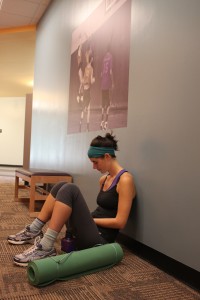The WHEE For Life program, which stands for “Wellness Helps Employees Excel,” began in 2009 in reaction to a statewide mandate for North Carolina. The goal for WHEE For Life is to provide wellness opportunities to employees both on and off campus dealing with lowering stress, cutting out bad smoking habits and increasing nutrition and exercise. The main issue concerning the program has been trying to raise awareness of the opportunities for WCU faculty and staff.
The combination of the Campus Recreation Center’s annual Cross Training Challenge (CTC) and the fresh start of a new year bring an increase in activity for WHEE For Life and the employees that it strives to help.
The CTC allows participants to pick and choose from a wide selection of fitness activities to cater to their definition of what wellness is including running, swimming, climbing, yoga, dance and more. Participants can get exactly what they want out of the challenge.
Shauna Sage, Director of Campus Recreation and Wellness, enjoys that characteristic the most.
“It forces me to get out of my comfort zone and it makes me more well-rounded fitness wise,” said Sage.
The CTC began on Jan. 14, aligning perfectly with people who made New Year’s Resolutions to better their physical health. According to the American College of Sports Medicine Health and Fitness Journal, the top 3 resolutions for adults this year were to begin exercising, lose weight and to stop smoking. WHEE For Life and the CTC offer programs and exercises that can help faculty and staff start on those resolutions.
The Campus Recreation Center sees a significant increase in activity at the start of the second semester for both students and WCU staff. Considering it takes 3 months of consistency for true behavior change, the trick is getting participants to stay motivated.
Sage said that Campus Recreation Center activity starts to drop off dramatically after spring break. The drop off could just be people choosing to go outside for their workouts or an increase in schoolwork, but it could also be caused by a gradual loss of motivation.
When the CTC was seeing a similar trend with a low completion percentage, they decided to open up the challenge to faculty that aren’t members of the Campus Recreation Center, add more activities and decrease the distances needed for completion.
According to Amy McKenzie, a WCU staff member participating in the challenge, the checklist used to keep track of times and distances can help with the motivation factor. She said that it helps set goals for what she wants to accomplish and improvement is clearly tracked over the course of the challenge.
Although McKenzie has practiced the exercises to the point where they start to become easier, she can increase distances and weight as needed to provide challenging progress. For example, she has been able to increase the resistance in the cycling exercise.
“I feel stronger and more fit,” said McKenzie.
The CTC also organizes their exercises in a way that caters to the busy schedules of professors and staff members. Many activities are grouped together so participants can get a diverse workout in a short amount of time and these groupings of exercise occur throughout the entire day.
McKenzie, who has participated in the CTC for several years, plans on continuing to balance exercise with work even after the challenge concludes and plans on participating next year as well.
Although activity for both the CTC and WHEE For Life is jump started by New Year’s Resolutions, there is still plenty of room for the programs to grow and for more staff members to take advantage of the benefits.
Western cannot provide free gym membership to faculty, but they do offer membership at the extremely discounted price of $15 a month.
Kellie Monteith, Assistant Vice Chancellor for Student Affairs, enjoys being one of nine WHEE For Life board members volunteering their time to the program, but thinks that more people around campus could get involved.
“My favorite aspect is working with the people I do,” said Monteith. “I think we all value what we do, but we would like it if more people on campus supported us.”





